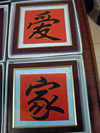|
jade sand painting
Name for a type of Chinese modern
objet d'art, which is created by affixing coloured and finely granulated
jade
to the surface of
paper in an artistic fashion, similar to ordinary sandpaper, which was
invented in
China,
probably as early as
the 13th century AD. By coating the paper with different colours of the
fine granulated jade, both portraits and landscapes can be formed, as
well as all kinds of objects and abstract art, somewhat
reminiscent of the sand
mandala
as used in
Vajrayana Buddhism
(fig.).
In addition, also
Chinese calligraphy
is made,
especially characters in Chinese script. Akin to jade carvings, the
possession of a jade sand painting is believed to have the power to bring
good luck and protection. Sometime referred to as jade sand paper, and in Chinese, known as
yu sha hua (玉沙画),
i.e. ‘jade sand painting’ or ‘granulated jade drawing’. In
Myanmar,
a similar concept is used to make
Burmese sand paintings (fig.),
using sand of the Irrawaddy River.
回






|

